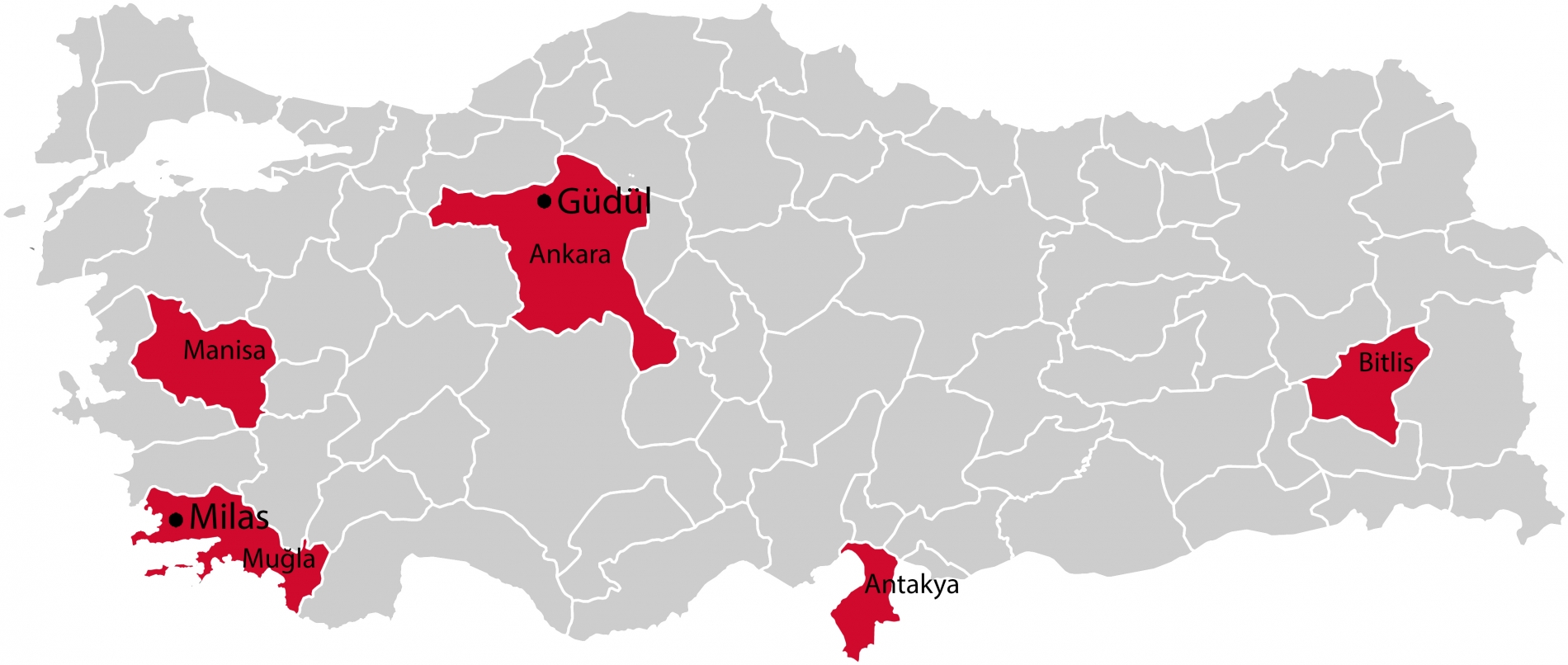Case Studies
- English
- Türkçe
General Information
Case study sites are selected to to represent four main climatic zones identified by TS825. Field surveys in Güdül (Ankara), Milas (Muğla), Antakya, Kemerköy (Manisa) and Bitlis which will comprise the case study locations to cover all local climate regions in Turkey based on TS825 (2008) and diverse building types in these. Considered building typologies are timber-framed buildings with different infill materials. Following a general field trip, up to 5 buildings will be chosen from each location based on factors such as physical integrity, modifications the building has undergone, the period that the residents have lived in the same property and any indications of damage due to exposure. Up to 5 archetypal buildings will be chosen from each town based on building authenticity and indications of damage, and surveyed for geometry, construction system, materials, primary agents of deterioration and moisture risk by using non-destructive methods and risk assessment techniques specified in BS5250 (2011),BSI/UK/899/ST/0816/EN/HL (2017) and other UKCMB guidance.
Methodology
The first work stream as the problem definition stage, aims at defecting detecting problems related to building fabric, indoor comfort level, and heritage value of the building. Since, the most immediate stakeholders of this project are the residents of the housing stock on which we will focus, we will engage with them in several ways via open-ended resident surveys to ensure that their perspective and firsthand experience as the user is taken.
Environmental health monitoring of selected building is done in each town using stand-alone temperature and relative humidity sensors to be placed inside and outside the buildings during heating and cooling seasons, as well as, for a limited number of cases identified as critical, wind-driven rain (WDR) gauges to quantify exposure. The monitoring data will be used for diagnosis of the hygrothermal performance of the buildings, as well as to quantify exposure. Monitoring will continue for at least a year to capture seasonal variations in the data [UCL, UKCMB and METU]. Laboratory testing of construction materials in controlled environments, and in-situ envelope measurements (U-value measurements) will also be conducted. The degree of soundness of the materials, especially timber elements, will be examined.
Engagement activities will be conducted at case study locations with resident groups from a wide cross-section of ages and gender. This includes open-ended interviews and completion of questionnaires to elicit a thorough understanding of
(i) space utilization and residents’ experience of living in their homes (and to identify retrofit priorities),
(ii) energy use patterns (including heating and ventilating), and
(iii) running costs (electricity, gas and other fuels), and through different seasons [METU, KOR-DER and STAB].
A small-scale local informal meeting will be organised at each case study town with local practitioners and representatives from the relevant private sector organisations in the area in order to gain insight about local practice and the sector’s needs and problems [METU, UCL, KOR-DER, SAYKA].*
*Because of the COVID-19 pandemic, the planned meetings and questionnaires will be held online.
Location of Case Studies in Turkey
Antakya - Zone 1 Milas (Muğla) - Zone 2 Kemerköy (Manisa) - Zone 2 Güdül (Ankara) - Zone 3 Bitlis - Zone 4

